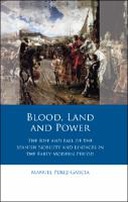Explore

The analysis of land management, lineage and family through the case study of early modern Spanish nobility from sixteenth to early nineteenth century is a major issue in recent historiography. It aims to shed light on how upper social classes arranged strategies to maintain their political and economic status. Rivalry and disputes between old factions and families were attached to the control and exercise of power. Blood, land management and honour were the main elements in these disputes. Honour, service to the Crown, participation in the conquest and ‘pure’ blood (Catholic affiliation) were the main features of Spanish nobility. This book analyses the origins of the entailed-estate (mayorazgo) from medieval times to early modern period, as the main element that enables us to understand the socio-economic behaviour of these families over generations. This longue durée chronology within the Braudelian methodology of the research aims to show how strategies and family networks changed over time, demonstrating a micro-history study of daily life.
This book is included in DOAB.
Why read this book? Have your say.
You must be logged in to comment.
Editions

